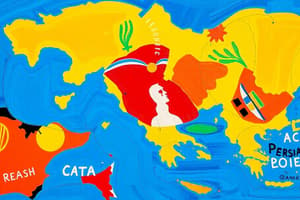Podcast
Questions and Answers
What was the primary motivation for the Ionian Revolt?
What was the primary motivation for the Ionian Revolt?
- The desire to expand Ionian territory into mainland Greece.
- A desire for greater autonomy and the removal of oppressive Persian rule. (correct)
- A desire to form a unified Greek state under the leadership of the Ionian city-states.
- The desire to overthrow the Persian monarchy and establish an independent Greek empire.
Which of these is considered a major battle in the Ionian Revolt?
Which of these is considered a major battle in the Ionian Revolt?
- The Battle of Marathon
- The Battle of Salamis
- The Siege of Miletus (correct)
- The Battle of Thermopylae
What was the outcome of the Ionian Revolt?
What was the outcome of the Ionian Revolt?
- The Ionian cities achieved independence from Persian rule.
- The revolt was decisively suppressed by the Persians, leading to increased control over Ionia. (correct)
- The Ionian Revolt led to the end of the Persian Empire.
- The Ionian revolt led to the establishment of a unified Greek empire.
What was the significance of the Ionian Revolt?
What was the significance of the Ionian Revolt?
What was a primary factor in the Ionian Revolt’s failure?
What was a primary factor in the Ionian Revolt’s failure?
What can be inferred about the relationship between the Persians and the Ionian city-states before the revolt?
What can be inferred about the relationship between the Persians and the Ionian city-states before the revolt?
Which of these factors likely contributed to the spread of the Ionian Revolt across different cities?
Which of these factors likely contributed to the spread of the Ionian Revolt across different cities?
Which of these is NOT a consequence of the Ionian Revolt?
Which of these is NOT a consequence of the Ionian Revolt?
Flashcards
Ionian Revolt
Ionian Revolt
A rebellion by Greek city-states in Ionia against Persian rule, motivated by oppression and a desire for independence.
Ionia
Ionia
A region on the western coast of Anatolia (modern-day Turkey), where Greek colonists settled and established city-states.
Tyrants
Tyrants
Leaders appointed by Persia to rule over Ionian cities, often enforcing brutal policies and exceeding their authority.
Attack on Sardis
Attack on Sardis
Signup and view all the flashcards
Miletus
Miletus
Signup and view all the flashcards
Battle of Lade
Battle of Lade
Signup and view all the flashcards
Consequences of the Revolt
Consequences of the Revolt
Signup and view all the flashcards
Significance of the Ionian Revolt
Significance of the Ionian Revolt
Signup and view all the flashcards
Study Notes
Background
- The Ionian Revolt was a rebellion of Greek city-states in Ionia against Persian rule.
- Ionia was a region on the western coast of Anatolia (modern-day Turkey).
- Ionians were Greek colonists who migrated to this area.
Causes of the Revolt
- Persian rule was perceived as oppressive, with heavy taxation and limitations on local autonomy.
- Tyrants, installed by Persia, often ruled brutally and against the interests of their subjects.
- The Ionians were often subject to Persian demands for military service.
Key Figures
- Aristagoras, tyrant of Miletus, is considered a primary instigator of the revolt.
- He had personal motivations for leading the rebellion.
Course of the Revolt
- The revolt began with the attack on Sardis, the Persian capital in Lydia.
- This action, led by Aristagoras, was partially successful.
- Several Ionian cities joined the rebellion with the aim of achieving greater autonomy.
- The revolt spread quickly across different cities in Ionia.
- Persian forces assembled a large military response, leading to a clash of strength.
Major Battles
- Miletus, the leading city in Ionia, was a significant target of Persian military actions.
- The Persian army besieged Miletus, ultimately achieving a decisive victory and suppressing the rebellion.
- A major naval battle took place off Lade (or Lade Island) near Miletus.
- Persian naval forces successfully crushed the Ionian fleet.
Consequences of the Revolt
- The rebellion was brutally suppressed by the Persians.
- Many Ionian cities were destroyed or their inhabitants massacred.
- The Persians imposed a heavier yoke of control over the region, and re-established local tyrants.
- The revolt demonstrated the strength of the Persian Empire and its military capabilities.
- It paved the way for further Persian expansion into mainland Greece during subsequent conflicts.
- Greek city-states, further north and mainland Greece, were put on guard by the example of the Ionian cities.
- Although suppressed, the revolt fueled Greek resistance and contributed to the Greco-Persian Wars that followed.
Significance
- The Ionian Revolt was a crucial episode leading up to the Greco-Persian Wars.
- It demonstrated the resistance to Persian imperialism amongst the Greek city-states in Asia Minor.
- It also highlighted divisions amongst the Greek city-states. Not all Ionian cities rebelled, and some even fought against the rebels.
Studying That Suits You
Use AI to generate personalized quizzes and flashcards to suit your learning preferences.




